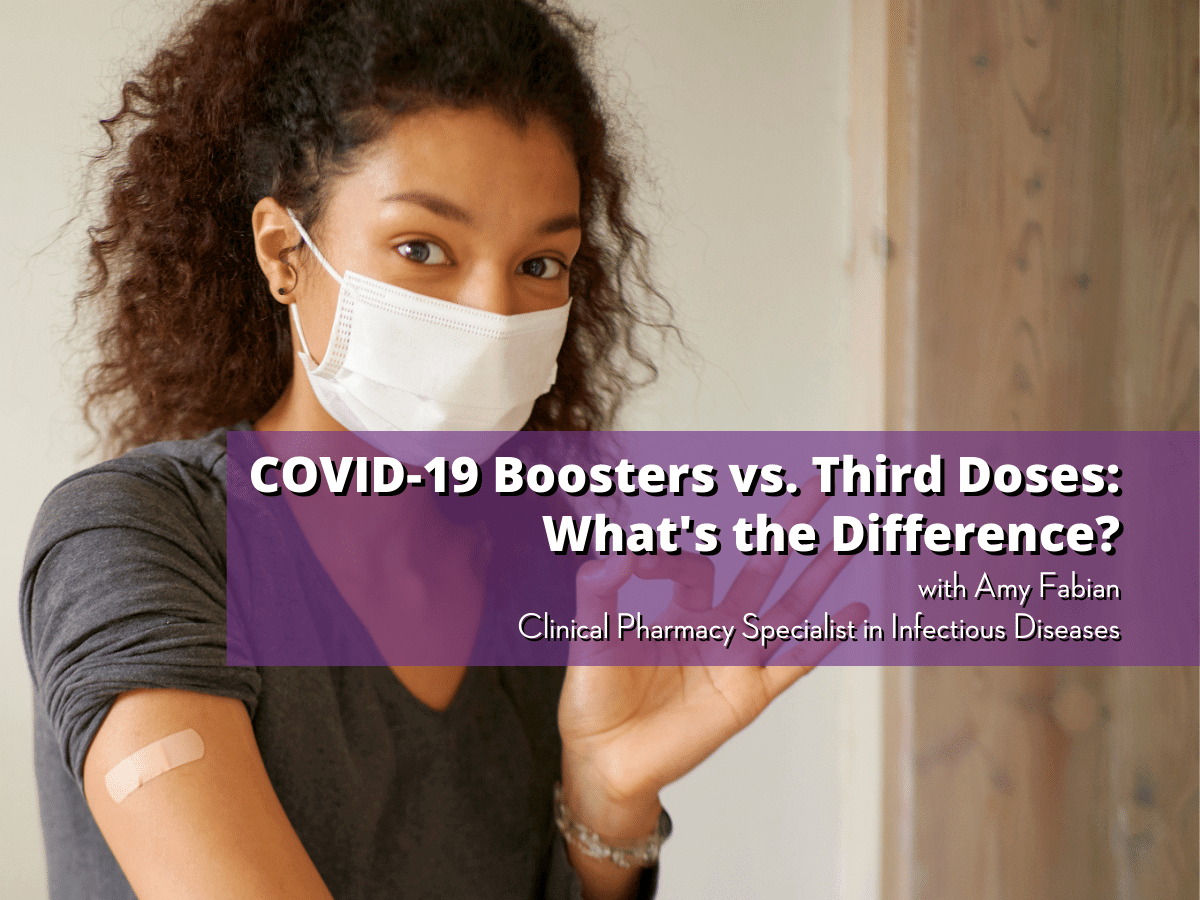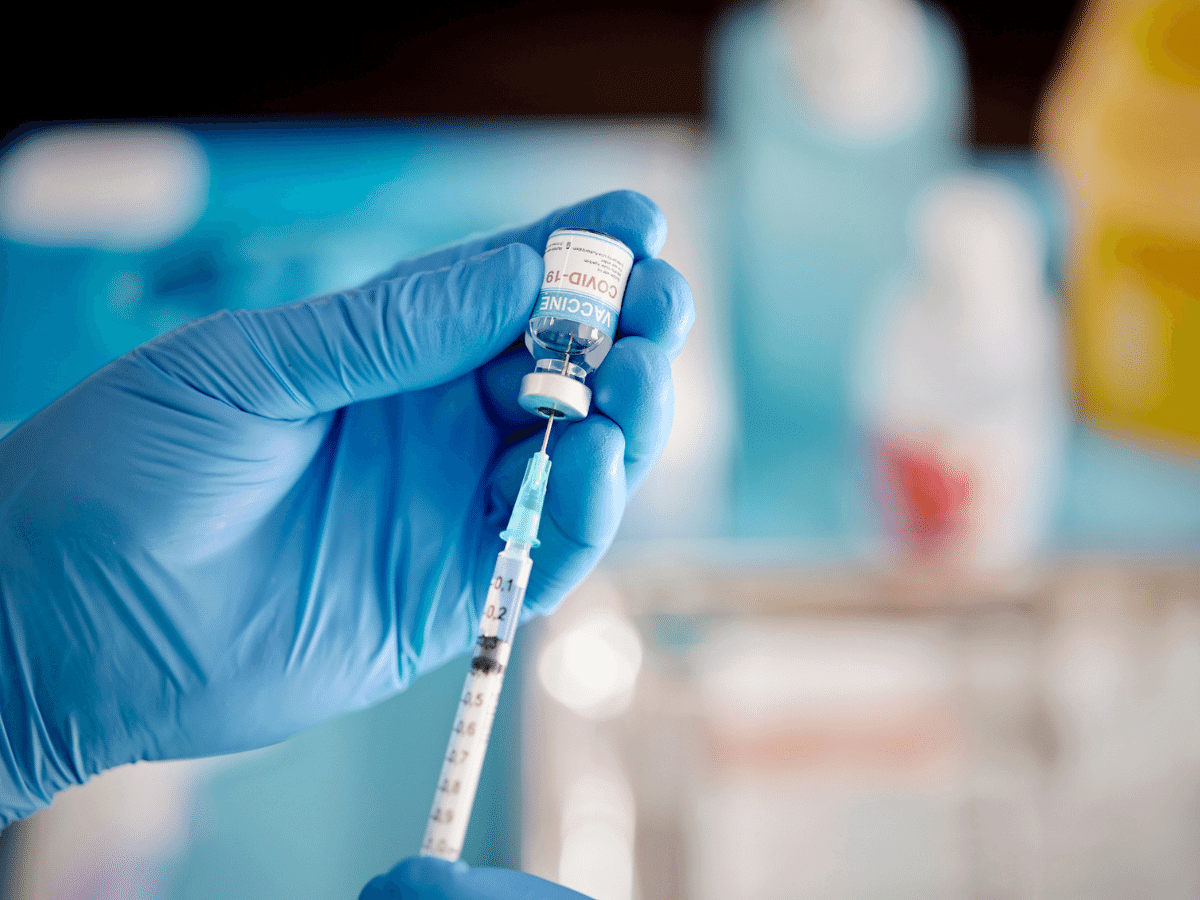COVID-19 Third Dose vs. Booster Dose

Medically reviewed by Baptist Health
The language surrounding additional COVID-19 vaccine doses is important. While a booster dose and a third dose sound similar, and are sometimes being used interchangeably, they actually refer to two very different things.
What is a COVID-19 third dose?
Third doses of the vaccine are for those who are immunocompromised and therefore, may require additional vaccine to reach full immunity levels. According to the CDC, “People with moderately to severely compromised immune systems are especially vulnerable to COVID-19, and may not build the same level of immunity to 2-dose vaccine series compared to people who are not immunocompromised.”
This additional dose is intended to improve immunocompromised people’s response to their initial two-dose mRNA vaccine series. The CDC recommends that people with moderately to severely compromised immune systems receive an additional dose of mRNA COVID-19 vaccine at least 28 days after a second dose of Pfizer-BioNTech COVID-19 vaccine or Moderna COVID-19 vaccine.
This includes people who have:
- Been receiving active cancer treatment for tumors or cancers of the blood
- Received an organ transplant and are taking medicine to suppress the immune system
- Received a stem cell transplant within the last 2 years or are taking medicine to suppress the immune system
- Moderate or severe primary immunodeficiency (such as DiGeorge syndrome, Wiskott-Aldrich syndrome)
- Advanced or untreated HIV infection
- Active treatment with high-dose corticosteroids or other drugs that may suppress your immune response
If you’re unsure if a third dose is appropriate for you, talk to your healthcare provider about your specific medical condition.
What is a COVID-19 booster dose?
On September 23, 2021, the Centers for Disease Control and Prevention’s Advisory Committee on Immunization Practices (ACIP) recommended certain populations receive a booster shot of Pfizer-BioNTech’s COVID-19 Vaccine at least six months after the completion of their Pfizer vaccine primary two-shot series.
The booster dose differs from the third dose in that it is for those who are immunocompetent, or those who demonstrate the standard immune response after two doses.
The recommendations are as follows:
- people 65 years and older should receive a booster shot
- residents in long-term care settings should receive a booster shot
- people aged 50 to 64 with certain underlying medical conditions should receive a booster shot
- people 18 to 49 who are at high risk for severe COVID-19 due to certain underlying medical conditions may receive a booster shot
- people aged 18-64 years who are at increased risk for COVID-19 exposure and transmission because of occupational or institutional setting may receive a booster shot
Frequently Asked Questions
Q: When can I get a COVID-19 vaccine booster if I am NOT in one of the recommended groups?
A: Additional populations may be recommended to receive a booster shot as more data becomes available. The COVID-19 vaccines approved and authorized in the United States continue to be effective at reducing risk of severe disease, hospitalization, and death. However, the virus that causes COVID-19 constantly evolves. Experts are looking at all available data to understand how well the vaccines are working for different populations. This includes looking at how new variants, like Delta, affect vaccine effectiveness.
Q: If we need a booster shot, does that mean that the vaccines aren’t working?
A: No. COVID-19 vaccines are working well to prevent severe illness, hospitalization, and death, even against the widely circulating Delta variant. However, public health experts are starting to see reduced protection, especially among certain populations, against mild and moderate disease.
Q: What should people who received Moderna or Johnson & Johnson’s Janssen vaccine do?
A: The Advisory Committee on Immunization Practices (ACIP) and CDC’s recommendations are bound by what the U.S. Food and Drug Administration’s (FDA) authorization allows. At this time, the Pfizer-BioNTech booster authorization only applies to people whose primary series was Pfizer-BioNTech vaccine. People in the recommended groups who got the Moderna or J&J/Janssen vaccine will likely need a booster shot. More data on the effectiveness and safety of Moderna and J&J/Janssen booster shots are expected in the coming weeks. With those data in hand, CDC will keep the public informed with a timely plan for Moderna and J&J.
Q: What are the risks to getting a booster?
A: For many who have completed their primary series with Pfizer-BioNTech vaccine, the benefits of getting a booster shot outweigh the known and potential risks. So far, reactions reported after the third Pfizer-BioNTech shot were similar to that of the 2-shot primary series. Fatigue and pain at the injection site were the most commonly reported side effects, and overall, most side effects were mild to moderate. However, as with the 2-shot primary series, serious side effects are rare, but may occur.
Q: Does this change the definition of “fully vaccinated” for those eligible for booster shots?
A: People are still considered fully vaccinated two weeks after their second dose in a 2-shot series, such as the Pfizer-BioNTech or Moderna vaccines, or two weeks after a single-dose vaccine, such as the J&J/Janssen vaccine. This definition applies to all people, including those who receive an additional dose as recommended for moderate to severely immunocompromised people and those who receive a booster shot.
Q: Can you explain these “permissive” recommendations related to people 18 to 49 with underlying medical conditions, and people 18 to 64 who may be exposed due to occupational/institutional setting? How are these different from the other two recommendations?
A: Adults 18–49 who have underlying medical conditions are at increased risk for severe illness from COVID-19, as are people 18-64 are in an occupational or institutional setting where the burden of COVID-19 infection and risk of transmission are high. However, that risk is likely not as high as it would be for adults 50 years and older who have underlying medical conditions, or people who live in long-term care settings. With the lower risk, the data do not support that everyone who falls into this group should get a booster shot. Therefore, CDC’s recommendation is not as strong for these populations, but still allows a booster shot to be available for those who would like to get one. People 18 and older who are at high risk for severe COVID-19 due to underlying medical conditions or their occupation should consider their individual risks and benefits when making the decision of whether to get a booster shot. This recommendation may change in the future as more data becomes available.
Q: Will providers accept anyone who says they’re eligible to receive a booster shot? Will people need to show a doctor’s note/prescription or other documentation?
A: It’s important to note that individuals can self-attest (i.e. self-report that they are eligible) and receive a booster shot wherever vaccines are offered. This will help ensure there are not additional barriers to access for these select populations receiving their booster shot.
Q: Will I get an additional vaccination card for my third dose or booster dose?
A: At your first vaccination appointment, you should have received a vaccination card that tells you what COVID-19 vaccine you received, the date you received it, and where you received it. Bring this vaccination card to your additional dose vaccination appointment.
Q: Can you mix and match the vaccines?
A: For people who received either Pfizer-BioNTech or Moderna’s COVID-19 vaccine series, a third dose (immunocompromised) of the same mRNA vaccine should be used. A person should not receive more than three mRNA vaccine doses. If the mRNA vaccine product given for the first two doses is not available or is unknown, either mRNA COVID-19 vaccine product may be administered.
Q: What should immunocompromised people who received the J&J/Janssen vaccine do?
A: The FDA’s recent EUA amendment only applies to mRNA COVID-19 vaccines, as does CDC’s recommendation.
Emerging data have demonstrated that immunocompromised people who have low or no protection following two doses of mRNA COVID-19 vaccines may have an improved response after an additional dose of the same vaccine. There is not enough data at this time to determine whether immunocompromised people who received the Johnson & Johnson’s Janssen COVID-19 vaccine also have an improved antibody response following an additional dose of the same vaccine.
Getting Vaccinated at Baptist Health
First Dose Scheduling
Baptist Health Louisville and Baptist Health Corbin are currently scheduling first doses of the Pfizer vaccine. Your second dose will be scheduled at the time of your first-dose appointment.
Click here to schedule your first dose vaccine appointment.
Third Dose Scheduling
Baptist Health Louisville and Baptist Health Corbin are currently scheduling third doses of the Pfizer vaccine. Third doses of the vaccine are for those who are immunocompromised and therefore, may require additional vaccine to reach full immunity levels.
At this time, only those who meet the below criteria are eligible for the third dose of the Pfizer vaccine at Baptist Health:
- Have an immunocompromising condition. If unsure, please talk with your provider to determine if you fall into this category.
- Have already received doses 1 and 2 of the Pfizer vaccine. The third dose can only be received 28 days or more after the second dose. If you are seeking a third dose of another (non-Pfizer) vaccine, please visit https://www.vaccines.gov.
- Bring your vaccine card (may not be a photocopy) for doses 1 and 2 of the Pfizer vaccine to your third dose appointment.
Click here to schedule your third dose vaccine appointment.
Booster Dose Scheduling
Booster doses of the Pfizer-BioNTech vaccine will be given at Baptist Health Corbin and Baptist Health Louisville. The booster dose differs from the third dose in that it is for those who are immunocompetent, or those who demonstrate the standard immune response after two doses.
At this time, boosters are for:
- Those who received the two-dose Pfizer-BioNTech vaccine, with the second dose administered at least 6 months ago.
Those eligible are individuals:
- Who have not yet received a third dose
- Who have not received Moderna or Johnson & Johnson vaccines
- Who are 65 years of age and older
- Who are 18 through 64 years of age AND
- At high risk for severe COVID-19 due to underlying medical conditions such as diabetes, heart, kidney or lung disease or a BMI greater than 25.
- Whose frequent institutional or occupational exposure puts them at high risk of serious complications of COVID-19. Examples include those working in healthcare and education.
Several pharmacies in the community are also offering both third shots and boosters.
Click here to schedule your booster dose vaccine appointment.
Get Fully Vaccinated for Maximum Protection Against COVID-19
COVID-19 vaccines are free, available from many providers, and highly effective. To schedule a first dose, third dose if you are immunocompromised and meet the criteria, or if you meet the eligibility requirements to receive a Pfizer COVID-19 booster, make an appointment today. Being fully vaccinated protects you as well as those around you.
Next Steps and Useful Resources:
Schedule Your Vaccine Appointment
Start Your COVID-19 Test Online
What to Do if You Miss Your Second COVID Vaccine
What to Bring: Considerations for Your Vaccine Appointment
FDA Panel Endorses COVID Boosters – But Not for Everyone



